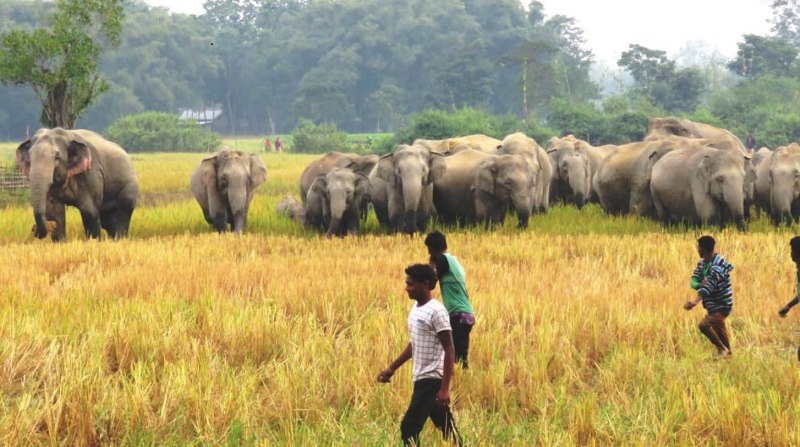Jajpur: The news of a jumbo trampling over four villagers and crushing them to death in Jajpur district was all over all local dailies January 24. As the story goes— a wild tusker had entered the village a few days ago and went on a rampage; destroying standing crops and several houses. The pachyderm also killed at least four persons and injured more than 15 people.
The death of four persons in an elephant attack at Kalinganagar’s Danagadi block in Jajpur district left locals fumed who staged a road blockade Monday alleging that Forest department officials were not taking adequate steps to ward off the animals.
Though elephant- human face-off has become regular news, the residents of hamlets bordering forests are still not aware of precautions to be taken to avoid such mishaps.
Human-elephant conflict is a major conservation concern in elephant range countries.
Expansion of human settlements, agricultural fields, and industries have resulted in widespread loss of elephant habitat, degraded forage, reduced landscape connectivity, and a significant decline in elephant populations relative to their historical size and overall range.
As their habitats shrink, elephants are progressively forced into closer contact with people, resulting in more frequent and severe conflict over space and resources with consequences ranging from crop-raiding to reciprocal loss of life.
The roads which connect one jungle with another are blocked due to the expansion work of the industries and mining activities. The man in the lure of elephants’ precious teeth has killed them. As a result, the pachyderms have lost their mental stability and get attracted to the human habitat.
Researchers have found that the favourite foods of elephants are barks of bamboo tree, banyan tree and pipal tree, and wild grass. An elephant eats 120 to 150 kg of food in a day.
However, the inevitable loss of big trees due to mining activities and extraction of black stones has created havoc. For this reason, the sizes of the jungles have been reducing day by day. The elephants find difficulties to collect their food from the jungle and so, they stray into the human habitats in search of food and sometimes water. As the elephants love crop items the most, they are attracted to paddy in the season of paddy crops. Researchers pointed out that the destruction of paddy by the jumbos is unintentional.
The country liquor aromas also attract the pachyderms and in their search they also destroy human habitats.
It is a routine for the elephants to trek 20 to 40 km daily. They have a particular corridor for their movement which extends from five to ten kilometers outside the jungle. But big mining corporations in Jajpur district have covered these corridors for which the elephants choose human habitats for trekking.
PNN
